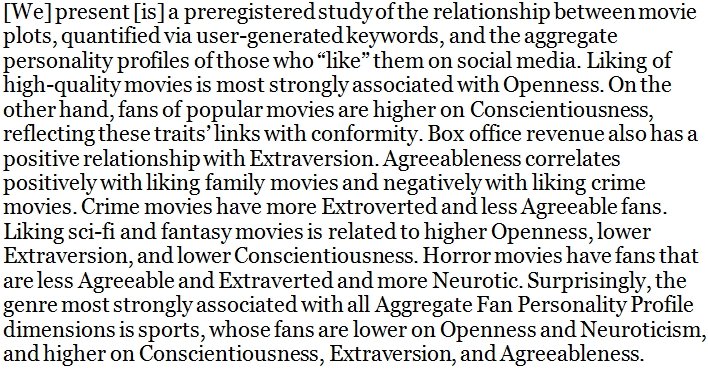First a primer on the Big Five traits:

Fans of "high-quality" movies are high in Openness, reflecting creativity and curiosity; artsy intellectual types.
Fans of popular movies are high in Conscientiousness and Extraversion, reflecting social conformity and sociability; Joe Sixpack.
Fans of family movies and people who dislike crime movies are high in Agreeableness, reflecting emotionally sensitivity and sympathy; moms.
Fans of crime movies and people who dislike family movies are low in Agreeableness and high in Extraversion; outgoing stern-faced types.
Fans of sci-fi and fantasy movies are high in Openness and low in Extraversion and Conscientiousness; introverted disorganized creative-minded neeeeerds.
Fans of horror movies are high in Neuroticism and low in Agreeableness and Extraversion; people who wear leather trench coats alone at home while hating the world.
Fans of sports movies are high in Conscientiousness, Extraversion, and Agreeableness, and low in Openness and Neuroticism; you're probably a regional sales manager and have a solid structured life.
What do your movie preferences say about you?
Openness to experience is a general appreciation for art, emotion, adventure, unusual ideas, imagination, curiosity, and variety of experience. People who are open to experience are intellectually curious, open to emotion, sensitive to beauty and willing to try new things. They tend to be, when compared to closed people, more creative and more aware of their feelings. They are also more likely to hold unconventional beliefs. High openness can be perceived as unpredictability or lack of focus, and more likely to engage in risky behavior or drug-taking.[37] Moreover, individuals with high openness are said to pursue self-actualization specifically by seeking out intense, euphoric experiences.
Conscientiousness is a tendency to display self-discipline, act dutifully, and strive for achievement against measures or outside expectations. It is related to the way in which people control, regulate, and direct their impulses. High conscientiousness is often perceived as being stubborn and focused. Low conscientiousness is associated with flexibility and spontaneity, but can also appear as sloppiness and lack of reliability.[36] High scores on conscientiousness indicate a preference for planned rather than spontaneous behavior.[39] The average level of conscientiousness rises among young adults and then declines among older adults.
- I have excellent ideas.
- I am quick to understand things.
- I use difficult words.
- I am full of ideas.
Extraversion is characterized by breadth of activities (as opposed to depth), surgency from external activity/situations, and energy creation from external means.[41] The trait is marked by pronounced engagement with the external world. Extraverts enjoy interacting with people, and are often perceived as full of energy. They tend to be enthusiastic, action-oriented individuals. They possess high group visibility, like to talk, and assert themselves. Extraverted people may appear more dominant in social settings, as opposed to introverted people in this setting.[42]
- I am always prepared.
- I pay attention to details.
- I get chores done right away.
- I like order.
- I follow a schedule.
- I am exacting in my work.
Agreeableness reflects individual differences in general concern for social harmony. Agreeable individuals value getting along with others. They are generally considerate, kind, generous, trusting and trustworthy, helpful, and willing to compromise their interests with others.[1] Agreeable people also have an optimistic view of human nature.
- I am the life of the party.
- I do not mind being the center of attention.
- I feel comfortable around people.
- I start conversations.
Neuroticism is the tendency to experience negative emotions, such as anger, anxiety, or depression.[47] It is sometimes called emotional instability, or is reversed and referred to as emotional stability. According to Hans Eysenck's (1967) theory of personality, neuroticism is interlinked with low tolerance for stress or aversive stimuli.[48] Neuroticism is a classic temperament trait that has been studied in temperament research for decades, before it was adapted by the FFM.[49] Those who score high in neuroticism are emotionally reactive and vulnerable to stress. They are more likely to interpret ordinary situations as threatening. They can perceive minor frustrations as hopelessly difficult. They also tend to be flippant in the way they express emotions. Their negative emotional reactions tend to persist for unusually long periods of time, which means they are often in a bad mood.
- I am interested in people.
- I sympathize with others' feelings.
- I have a soft heart.
- I take time out for others.
- I feel others' emotions.
- I make people feel at ease.
- I get irritated easily.
- I get stressed out easily.
- I get upset easily.
- I have frequent mood swings.

Fans of "high-quality" movies are high in Openness, reflecting creativity and curiosity; artsy intellectual types.
Fans of popular movies are high in Conscientiousness and Extraversion, reflecting social conformity and sociability; Joe Sixpack.
Fans of family movies and people who dislike crime movies are high in Agreeableness, reflecting emotionally sensitivity and sympathy; moms.
Fans of crime movies and people who dislike family movies are low in Agreeableness and high in Extraversion; outgoing stern-faced types.
Fans of sci-fi and fantasy movies are high in Openness and low in Extraversion and Conscientiousness; introverted disorganized creative-minded neeeeerds.
Fans of horror movies are high in Neuroticism and low in Agreeableness and Extraversion; people who wear leather trench coats alone at home while hating the world.
Fans of sports movies are high in Conscientiousness, Extraversion, and Agreeableness, and low in Openness and Neuroticism; you're probably a regional sales manager and have a solid structured life.
What do your movie preferences say about you?





